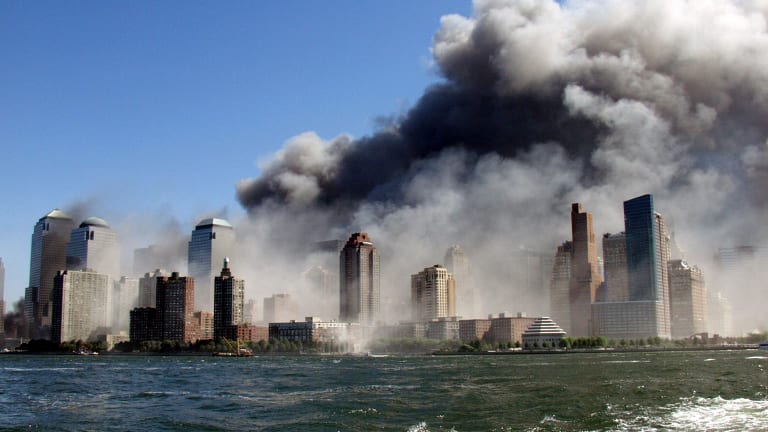It has been almost exactly one month since the 18th anniversary of 9/11. Since then, the world has gone on. The Trump-Ukraine scandal persists, citizens of Hong Kong continue to protest, the Bahamas slowly pick themselves up from Hurricane Dorian, and the college application season goes by far too quickly. We’ve moved on.
But when 9/11 actually happened, it was harder to move on. Most people will not ever forget that day. Where were you between 8:46 and 10:28 a.m. on September 11, 2001? At school? Home? Work? Out to breakfast?
I wasn’t anywhere. My high school class of 2020 is the first to either not be born or to have no memory of 9/11. I wasn’t alive when the towers crumbled, when desperate civilians jumped out of falling buildings praying for a miracle, when the supposed invincibility of the United States collapsed on television screens across the world.
I also wasn’t alive when Americans strung our flag across a widening chasm of fear, hopelessness, and grief and pulled the gap together with strength forged entirely from damaged pride. I wasn’t alive when Americans dedicated their minds, bodies, and souls to defending our country, a young, passionate country that is still in the process of improving itself, a country for which many of them would die before letting a brutal, depraved terrorist group rip it to pieces. I wasn’t alive when Americans woke up and realized that all our yelling at each other, all our resentment of opposing ideologies, all our ignorance of those who happen to disagree with us: it makes us weak. It makes us a country so overwhelmed by internal disagreements that any external threat leaves us on the precipice of disaster. And, when faced with this external threat on September 11, 2001, Americans collectively realized that to be a Republican, or a Democrat, or someone who is frankly fed up with both sides was not a replacement for but merely a subset of what it means to be an American.
So yes, I was not alive when Americans received a wake-up call that killed 2,977 of their own and demanded that they disregard their differences and find strength in their commonality. But I am alive now. I am here, 18 years and one month later, watching divisive politics infiltrate every realm of media, turning on the television only to see my political leaders trading insults without progress, and witnessing the withering away of a sense of common values in a country that has come to promote disparities over similarities. I’m here now, watching those around me transform from individual Americans into tribalistic factions, seeking to invalidate and destroy each other, caring for nothing but triumph over their opponents.
What do we need to wake us up again? Another attack? More deaths? Have we fallen so far that any sense of unity comes not from within, not from a shared desire to be respectful, to be productive, to be good, but only from an immediate, physical threat from an outside source? The United States was not formed based on geography or ethnicity or an accident of history. It is simply an idea meant to become something more, and it is one that defied all expectations by achieving unprecedented success. Only the idea of the United States can classify such a diverse mass of people into one group. We come in all varieties: different races, religions, financial backgrounds, political beliefs… the divisions in our lives often seem so immense that they subvert any possibility of unity. But our unity is not incumbent on a lack of diversity, but on the idea that our external diversity does not matter when we share everything that is important on the inside. I don’t care if your race, sexuality, gender, or ethnicity differ from mine. I only care that we share the right to speak, to vote, to practice religion, to challenge each other, to enjoy all the same privileges guaranteed to us by the fundamental ideas upon which the United States was built.
9/11 did not create unity; it simply reminded us that our unity is there to be found. Someone looking at the United States from the outside would perceive that we are the most diverse country in the world. And yes. We are. And it is important that we value our different backgrounds, experiences, and viewpoints. But in order to value our diversity, we have to identify our unity. And right now, just over 18 years after a horrific terror attack drew us together, for a brief moment, as the truly united states, our unity is nowhere to be found.
I was not there when 9/11 happened. I don’t remember. But it is almost as though everyone else was not either, because their memory, not of what happened, but what it meant, is fading away as well. It meant that there is no shortage of evil on this planet. It meant that we are not invincible. But 9/11 also meant that we can be stronger. We can pledge to educate ourselves, to develop our ideas, to stimulate the minds of others, to encourage respectful discussion, to talk to each other. Because the original success of the United States, a group of small, discombobulated colonies against the most powerful empire in the world, and our subsequent success against terror on September 11, 2001, mean something important: that unified strength supersedes large armies and collapsed towers, that shared values are more important than diverse appearances, and that the potential of a nation fueled by its ideas knows no limits.

